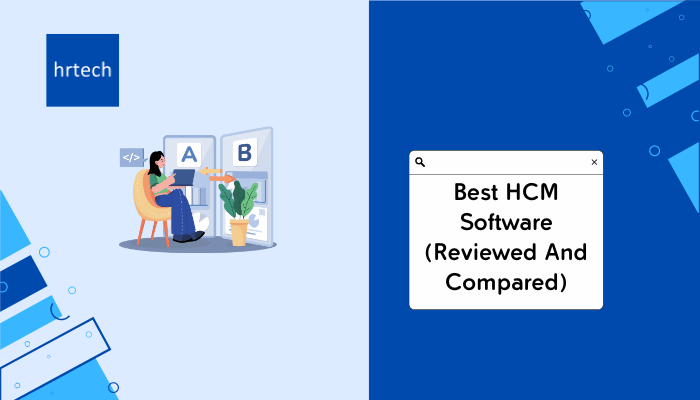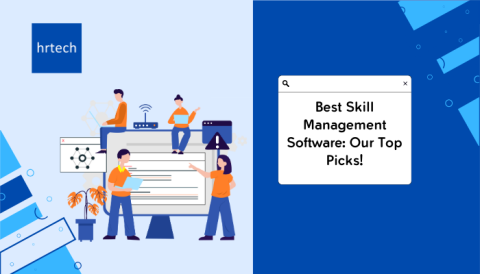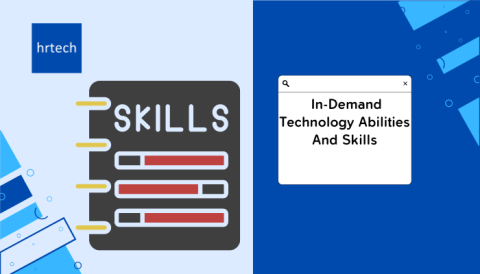When it comes to managing people, the right tools can make all the difference.
Human Capital Management (HCM) software is designed to help businesses streamline their HR processes, from hiring to employee management, to benefits administration.
But with so many options on the market, which one should you choose?
We’ve spent hours reviewing and testing different HCM software solutions. And out of them, we narrowed our list to the only top 11 picks for the best HCM software of 2025.
| Software: | Best For: | Standout Feature: | Pricing: |
| Workday | Large Enterprises | Advanced analytics and reporting | Free trial available. Custom pricing upon request (starts at $99/user/month). |
| factoHR | Small Businesses | Simple payroll management | Free version available. Custom pricing upon request. |
| Oracle HCM Cloud | Companies with complex HR processes | Highly customizable HR modules | Contact for pricing. Custom quotes based on business size. |
| ADP | Comprehensive Payroll | Full-service payroll | Free trial available. Custom pricing upon request (usually starts at $40/month plus $6/employee). |
| UKG | HR and Workforce Management | Advanced workforce management | Contact for pricing. Custom quotes based on business needs. |
| SAP SuccessFactors | Global Enterprises | Global HR management | Custom pricing upon request. |
| Akrivia HCM | Mid-Sized Businesses | Payroll and compliance management | Free trial available. Paid plans start at $40/user/month. |
| Keka | Fast-Growing Companies | Employee engagement tools | Free trial available. Paid plans start at $9/employee/month. |
| Paychex | Payroll Management | Full-service payroll | Free trial available. Paid plans start at $39/user/month. |
| Gusto | Startups | Employee benefits management | Free trial available. Paid plans start at $40/user/month plus $6/user/month. |
| Paycor | HR and Payroll Integration | Integrated HR and payroll | Custom pricing upon request. |
Below, you’ll find a detailed review of each software along with their pros, cons, features, and how they compare.
By the end of this guide, you’ll be able to pick the best HCM software based on your needs, whether you’re running a small business or a large enterprise.
Let’s dive in.
Why Trust Our Reviews?
At hrtech, we specialize in helping HR professionals and company leaders find the best solution to improve their HR processes.
In our review process, we follow a rigorous selection and testing process in finding and selecting the best software.
We not only focus on key features, but also the pros, cons, pricing, and other relevant details that actually matter in selecting the best software.
Plus, we don’t believe in overwhelming you with a lot of options. So we first test and review different software.
Then, we select only a few of them based on key criteria, different company sizes, and needs. And finally we share our top picks to help easily select the best software for your company. So you can count on us!
What To Look For In A Good HCM Software?
Before we get into the details of each software, let’s cover what makes an HCM software great.
1. Key Features
First, you want to look at the core features. A solid HCM software should cover:
- Employee Management – Tools to manage employee records, performance, and growth.
- Payroll & Benefits Administration – Seamless payroll processing and benefits tracking.
- Recruiting & Onboarding – Efficient recruiting tools and smooth onboarding processes.
- Compliance – Keeping up with regulations is crucial. Your software should make this easy.
- Reporting & Analytics – Insights into HR metrics, employee performance, and more.
2. Scalability And Flexibility
Your business won’t stay the same size forever. So, pick software that can grow with you. This means being able to add users, modules, and features without any hassle.
3. User Experience And Interface
Nobody wants to use clunky software. The interface should be clean, and easy to use. It not only saves time in training and usage, but makes the implementation process much easier.
4. Integration Capabilities
Good HCM software should connect seamlessly with all the other tools you use. Whether it’s your payroll system, CRM, or other software, seamless integration is key.
5. Security and Compliance
Now, Security and Compliance are important, especially because these software solutions handle sensitive employee data and payment information.
Look for software with strong encryption, regular updates, and compliance with industry standards like GDPR or HIPAA.
Our Selection Process
In our selection process, we evaluated each software based on a key set of criteria and weighted them based on their importance.
| Criteria | Weight (%) |
| Features | 30% |
| Pricing | 20% |
| User Experience | 20% |
| Integration Capabilities | 15% |
| Scalability | 10% |
| Security & Compliance | 5% |
Let’s break this down:
- Features – We gave the most weight to the features, as these are what directly impact your business operations.
- Pricing – Cost is a big deal, especially for small businesses. We looked for value for money.
- User Experience – A tool that’s hard to use is a tool that won’t be used.
- Integration Capabilities – The more, the better. You don’t want to be stuck with a system that doesn’t play well with others.
- Scalability – How well the software grows with your business.
- Security & Compliance – Vital, but most vendors offer solid security, so this got a smaller weight.
Now, let’s get into the nitty-gritty.
Best HCM Software Of 2025
1. Workday – Best For Large Enterprises

Our Score: 4.9/5 (Excellent)
Pricing: Free trial available. Custom pricing upon request (but usually starts at $99/user/month)
Key Features:
- Comprehensive HR management tools
- Advanced payroll and time tracking
- Advanced analytics and reporting
- Flexible benefit administration
- Seamless integration with financial tools
Why We Picked It?
Workday is built for large enterprises that need all the bells and whistles. We were impressed by its comprehensive HR management tools that handle everything from payroll to benefits.
But what really stood out is its analytics. Workday’s reporting tools are powerful, making it easier to make data-driven decisions.
Pros:
- Extremely scalable.
- Excellent customer support.
- Powerful analytics.
- Regular updates with new features.
Cons:
- High cost.
- Steep learning curve.
- Overwhelming for small businesses.
- Customization can be complex.
Integrations: Salesforce, Oracle, SAP, Microsoft Dynamics, Slack.
Best For:
Large enterprises with complex HR needs. If you’re running a big company, Workday is your go-to option. But if you’re a smaller or medium-sized business, the cost and complexity might not be worth it. In that situation, consider alternatives like factoHR, Keka, or Gusto.
2. factoHR – Best For Small Businesses

Our Score: 4.8/5 (Excellent)
Pricing: Free version available. Custom pricing upon request.
Key Features:
- Simple payroll management
- Employee self-service portal
- Time and attendance tracking
- Leave management
- Compliance management
Why We Picked It?
factoHR is perfect for small businesses that need solid HR tools without the extra tools and features.
It’s straightforward, and easy to use. We liked its simple payroll management and employee self-service portal, which makes it easy for employees to handle their own HR tasks.
Pros:
- Affordable pricing.
- Easy to use.
- Quick setup.
- Good customer support.
Cons:
- Limited advanced features.
- Basic reporting.
- Limited customization.
Integrations: QuickBooks, Xero, G Suite, Zoho, Slack.
Best For:
Small businesses that need a simple, relatively affordable HCM solution. If you’re just starting out or have a small team, factoHR offers great value. But if you’re looking for more advanced features, consider Workday or SAP SuccessFactors.
3. Oracle HCM Cloud – Best For Customization

Our Score: 4.7/5 (Very Good)
Pricing: Contact for pricing. Custom quotes based on business size.
Key Features:
- Highly customizable HR modules
- Talent management
- Workforce planning
- Comprehensive payroll
- Global HR capabilities
Why We Picked It?
Oracle HCM Cloud is a great all-in-one option. You can customize it to fit just about any need. We liked its flexibility, especially for businesses with unique HR processes.
Its global HR capabilities are also a big plus, making it a great option for multinational companies.
Pros:
- Highly customizable.
- Great for global businesses.
- Extensive features.
- Strong analytics.
Cons:
- Expensive.
- Complex setup and can be overwhelming for small teams.
- Requires IT support.
Integrations: Oracle ERP, Salesforce, Microsoft Dynamics, SAP, G Suite.
Best For:
Companies that need a highly customizable HCM solution. Oracle HCM Cloud is perfect if your business has unique needs. But for those who want something easier to set up and use, consider Keka, factorHR, or Gusto.
4. ADP – Best For Comprehensive Payroll

Our Score: 4.7/5 (Very Good)
Pricing: Free trial available. Custom pricing upon request (but usually paid plans start at $40/month plus $6/employee)
Key Features:
- Full-service payroll
- Benefits management
- Employee time tracking
- Recruitment tools
- Compliance and risk management
Why We Picked It?
ADP is really powerful when it comes to payroll. It’s advanced, reliable, and covers all the bases. We especially liked its comprehensive payroll features, which make it a great choice for businesses that need to manage payroll for large teams.
Pros:
- Excellent payroll features.
- Scalable for growing businesses.
- Strong compliance tools.
- Good customer support.
Cons:
- Pricing can be high.
- User interface could be more intuitive.
- Some features require add-ons.
Integrations: QuickBooks, Xero, Salesforce, Microsoft Dynamics, Oracle.
Best For:
Businesses that need comprehensive payroll management. ADP is a trusted software in payroll, and for good reason. But if you need more customizable HR features, Oracle HCM Cloud would be a better fit.
5. UKG – Best For HR and Workforce Management

Our Score: 4.6/5 (Very Good)
Pricing: Contact for pricing. Custom quotes based on business needs.
Key Features:
- Advanced workforce management
- Talent acquisition
- Payroll and benefits administration
- Performance management
- Employee engagement tools
Why We Picked It?
UKG is a leader in workforce management. It’s ideal for companies that need to manage large teams with complex scheduling needs.
We were impressed by its talent acquisition and employee engagement tools, which are some of the best in the industry.
Pros:
- Strong workforce management.
- Excellent talent acquisition tools.
- Good employee engagement features.
- Scalable for large teams.
Cons:
- Expensive and complex setup.
- Requires training to use effectively.
- Customer support can be slow.
Integrations: SAP, Salesforce, Oracle, Microsoft Dynamics, Workday.
Best For:
Companies with large teams and complex workforce management needs. UKG excels in managing large workforces, but if you’re a smaller company, consider alternatives like factoHR or Gusto.
6. SAP SuccessFactors – Best For Global Enterprises

Our Score: 4.5/5 (Very Good)
Pricing: Custom pricing upon request.
Key Features:
- Global HR management
- Talent management
- Learning and development tools
- Advanced analytics
- Performance management
Why We Picked It?
SAP SuccessFactors is built for global enterprises. It’s robust, scalable, and packed with features to manage a global workforce.
We liked its talent management and learning tools, which help companies develop their employees and retain top talent.
Pros:
- Great for global teams.
- Comprehensive features.
- Strong analytics.
- Scalable for large enterprises.
Cons:
- Expensive than other HCM.
- Complex setup and may require additional training.
- Some features may be more than needed for small businesses.
Integrations: SAP ERP, Oracle, Salesforce, Microsoft Dynamics, G Suite.
Best For:
Global enterprises that need a powerful HCM solution. SAP SuccessFactors is excellent for managing large, diverse teams across multiple locations. But if you’re not managing a global workforce, consider something more straightforward like ADP or UKG.
7. Akrivia HCM – Best For Mid-Sized Businesses

Our Score: 4.4/5 (Good)
Pricing: Free trial available. Paid plans start at $40/user/month.
Key Features:
- Payroll and compliance management
- Performance tracking
- Employee self-service
- Recruitment tools
- Learning and development
Why We Picked It?
Akrivia HCM is a great choice for mid-sized businesses.
It’s affordable, easy to use, and covers all the basic HR needs. We liked its performance tracking and employee self-service tools, which make it easy for businesses to manage their teams without getting bogged down in admin tasks.
Pros:
- Affordable.
- Easy to use.
- Good for mid-sized businesses.
- Quick setup.
Cons:
- Limited integration options
- Customer support could be better.
Integrations: Workday, Oracle, Vital, Mercer Mettl, Testlify
Best For:
Akrivia HCM is best for mid-sized businesses that need a reliable HCM solution without spending a lot. But if you need more advanced features, Workday or Oracle HCM Cloud are better options.
8. Keka – Best For Employee Engagement

Our Score: 4.3/5 (Good)
Pricing: Free trial available. Paid plans start at $9/employee/month.
Key Features:
- Employee engagement tools
- Payroll management
- Time and attendance tracking
- Performance management
- Recruitment tools
Why We Picked It?
Keka stands out for its focus on employee engagement. It’s packed with tools to keep your team motivated and productive.
We liked its engagement features, which help companies maintain a positive workplace culture.
Pros:
- Excellent engagement tools.
- Easy to use.
- Good payroll features.
- Scalable for growing businesses.
Cons:
- Limited customization.
- Basic reporting and analytics.
Integrations: QuickBooks, Xero, Zoho, G Suite, Slack.
Best For:
Keka is perfect for companies that want to keep their teams happy and engaged. It’s also great for fast growing companies because of its easy-to-scale and affordable plans. But if you need more advanced HR features right off the bat, consider UKG or ADP.
9. Paychex – Best For Payroll Management

Our Score: 4.2/5 (Good)
Pricing: Free trial available. Paid plans start at $39/user/month.
Key Features:
- Full-service payroll
- Benefits administration
- Time and attendance tracking
- Employee self-service
- Compliance management
Why We Picked It?
Paychex is another strong contender for payroll management. It’s reliable, easy to use, and covers all the basics. We liked its benefits administration and compliance tools, which make it a great choice for businesses that need to stay on top of regulations.
Pros:
- Good payroll features.
- Affordable pricing.
- Easy to use.
- Good compliance tools.
Cons:
- Customer support could be better.
- Compliance features are not as advanced as compared to other HCM.
Integrations: QuickBooks, BambooHR, Bullhorn, Azure, 7Shifts.
Best For:
Paychex Flex is great for small to mid-sized businesses that need to manage payroll without a hassle. But if you need more comprehensive HR features, consider ADP or Workday.
10. Gusto – Best For Startups

Our Score: 4.1/5 (Good)
Pricing: Free trial available. Paid plans start at $40/user/month plus $6/user/month.
Key Features:
- Full-service payroll
- Employee benefits management
- Time tracking
- Employee self-service
- Compliance management
Why We Picked It?
Gusto is perfect for small businesses and startups that need a simple, affordable payroll and HR solution. It’s easy to use, and its pricing is transparent. We liked its employee benefits management, which is a rare find at this price point.
Pros:
- Affordable.
- Easy to use.
- Transparent pricing.
- Good benefits management.
Cons:
- Limited advanced features.
- Basic reporting.
Integrations: QuickBooks, 15Five, G Suite, Zoho, Slack.
Best For:
Gusto is great for companies that want to manage payroll and benefits without spending a lot. But if you need more advanced features, consider ADP or Oracle HCM Cloud.
11. Paycor – Best For HR and Payroll Integration

Our Score: 4.0/5 (Good)
Pricing: Custom pricing upon request
Key Features:
- Integrated HR and payroll
- Time and attendance tracking
- Employee self-service
- Performance management
- Compliance management
Why We Picked It?
Paycor is a great choice for businesses that need strong HR and payroll integration. It’s easy to use, and its integrated features make it a great option for companies that want to streamline their HR processes.
Pros:
- Good HR and payroll integration.
- Easy to use.
- Affordable pricing.
- Good compliance tools and advanced reporting.
Cons:
- Limited advanced features.
- Interface could be better compared to other HCM.
- Customer support could be better.
Integrations: 15Five, The Predictive Index, Benefex, Workvivo, OnShift
Best For:
Paycor is great for companies that want to manage HR and payroll in one place. But if you need more advanced features, consider ADP or Workday.
Want to explore more software? Visit our marketplace to explore various other HR software and start simplifying your HR processes.
How To Choose The Best HCM Software?
Choosing the right HCM software is all about knowing your business needs. Here’s how to make sure you pick the right one.
1. Assess Your Business Needs
Start by listing your must-have features.
Do you need advanced payroll management? Or maybe employee engagement tools? Make sure the software you choose meets your core needs.
2. Consider Your Budget
Software costs can add up fast. Make sure you know your budget and stick to it. Remember, the most expensive option isn’t always the best.
3. Evaluate the Features
Go through each software’s features. Make sure it has everything you need and nothing you don’t.
4. Test The Software
Most HCM software offers free trials or demos. Use these to get a feel for the software before you commit.
5. Look At Customer Support
Good customer support is crucial. Check reviews and see what others are saying about the software’s support.
What Is Exactly An HCM Software?
Human Capital Management (HCM) is a comprehensive approach to managing an organization’s workforce.
It’s more than just HR software. It’s actually a full suite of tools designed to optimize the entire employee lifecycle, from hiring to retirement.
HCM systems integrate various HR functions, providing a unified platform to manage, engage, and develop your employees.
What Are The Functions Of HCM Software?
HCM software typically includes several key features that work together to streamline HR processes:
- Talent Management – Tools for recruiting, onboarding, and retaining top talent. This includes applicant tracking systems, onboarding modules, and performance management.
- Payroll and Benefits Administration – Seamless payroll processing and benefits management, ensuring employees are paid accurately and on time, and that their benefits are well-managed.
- Employee Self-Service – Allows employees to access and manage their personal information, benefits, and payroll details, reducing the administrative burden on HR teams.
- Learning and Development – Training and development tools to help employees grow within the company. This can include e-learning modules, certifications, and career development planning.
- Analytics and Reporting – Provides insights into workforce data, helping HR teams make informed decisions. This includes tracking performance metrics, turnover rates, and employee engagement levels.
Importance And Benefits Of HCM Software
HCM systems are important for modern businesses because they bring all HR-related processes into one place. This unification helps in several ways:
- Improved Efficiency – By automating routine HR tasks, HCM software frees up time for HR professionals to focus on strategic initiatives, such as talent development and employee engagement.
- Data-Driven Decisions – The analytics tools in HCM software provide insights that help in making better, data-backed decisions. For instance, identifying trends in employee turnover can lead to targeted retention strategies.
- Enhanced Employee Experience – With self-service portals and easy access to HR services, employees feel more in control of their information, which boosts satisfaction and engagement.
- Compliance and Risk Management – HCM software helps businesses stay compliant with labor laws and regulations, reducing the risk of costly fines and legal issues.
How HCM Differs From HRIS, HRMS, and ERP?
Now, it’s easy to get confused between HCM, HRIS, HRMS, and ERP, as these terms are often used interchangeably. However, there are distinct differences:
HCM vs. HRIS (Human Resource Information System):
HRIS is typically more focused on the basic administrative functions of HR, such as record-keeping and payroll.
It’s often a component within HCM, but HCM covers a broader range of HR activities, including talent management and strategic HR planning.
HCM vs. HRMS (Human Resource Management System):
HRMS is similar to HRIS but usually includes more features related to workforce management, such as time and attendance tracking.
HCM, however, covers all of this and adds layers of talent management and analytics, making it more comprehensive.
HCM vs. ERP (Enterprise Resource Planning):
ERP systems manage all core business processes, including finance, supply chain, and HR. HCM is often a module within ERP systems, but dedicated HCM software provides more specialized and detailed HR functionalities that might not be as robust in an ERP.
HCM software is essential for organizations that want to take a comprehensive approach to managing their workforce.
It integrates various HR functions into one system, improving efficiency, making data-driven decisions easier, and enhancing the overall employee experience.
Frequently Asked Questions:
1. What Types Of Businesses Benefit The Most From HCM Software?
HCM software is beneficial for businesses of all sizes, but it’s especially valuable for medium to large enterprises with complex HR needs.
These companies often have to manage large workforces, multiple locations, and diverse HR processes, making a comprehensive HCM solution crucial.
2. Is HCM Software Only For HR Professionals?
No, HCM software is designed for the entire organization. While HR teams are the primary users, managers, employees, and even executives benefit from the data and insights provided by HCM systems.
For example, managers can use it for performance reviews, while employees can access self-service tools.
3. Can HCM Software Integrate With Other Business Systems?
Yes, most HCM software is designed to integrate seamlessly with other systems such as ERP, payroll, and CRM tools.
This integration ensures that data flows smoothly between departments, reducing the need for manual data entry and minimizing errors.
4. How Secure Is HCM Software?
Security is a top priority for HCM software providers. These systems typically include strong encryption, regular security updates, and compliance with industry standards like GDPR or HIPAA.
However, it’s important to evaluate each software’s security features to ensure they meet your business’s specific needs.
5. How Difficult Is It To Implement HCM Software?
The difficulty of implementing HCM software varies depending on the complexity of the system and the size of your organization.
Most providers offer implementation support and training to ensure a smooth transition. However, it’s crucial to plan the rollout carefully, involve key stakeholders, and provide adequate training to users.
Final Thoughts
So, there you have it! The 11 best HCM software of 2025.
Whether you’re running a small business, midsize business or a large enterprise, we’ve covered software solutions for all business sizes and needs.
Remember, the best software is the one that meets your needs, fits your budget, and grows with your business.
If you need more help in selecting the right HCM software for your organization, don’t hesitate to get in touch with us. Our HR experts can help you save a lot of time and pick the right solution based on your unique needs. Contact us now to learn more!





